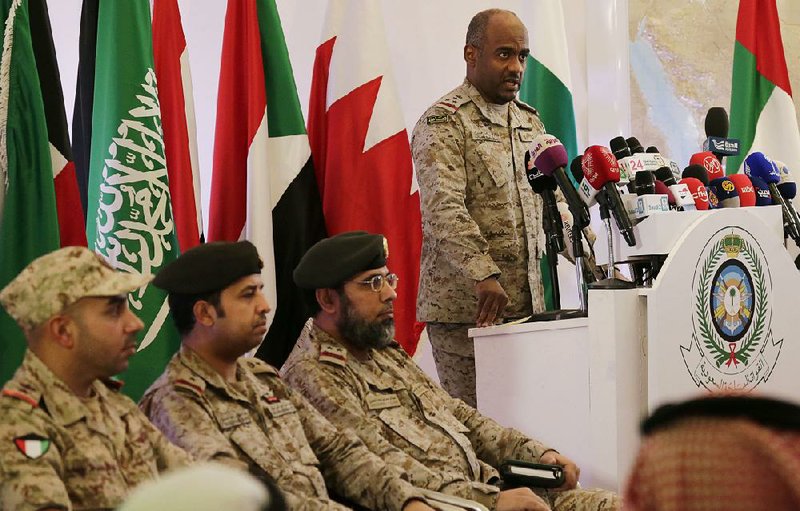UNITED NATIONS -- The United Nations Security Council stepped up efforts Tuesday to thwart a Houthi rebel takeover of Yemen, imposing an arms embargo on the leaders of the Shiite group, along with former President Ali Abdullah Saleh and his son.
Yemen, the Arab world's poorest country, has been pushed to the brink of collapse by ground fighting and Saudi-led airstrikes in support of current President Abed Rabbo Mansour Hadi, who was forced to flee to Saudi Arabia.
Observers have said the fighting in the Middle East nation is taking on the appearance of a proxy war between Sunni-dominated Saudi Arabia and Iran, the Shiite powerhouse backing the Houthis.
The Security Council resolution was approved in a 14-0 vote, with Russia abstaining. Moscow had insisted on an arms embargo on all parties to the conflict.
The resolution imposes the weapons embargo on five men: Houthi leader Abdul-Malik al-Houthi, second-in-command Abdullah Yahya al Hakim, military commander Abd al-Khaliq al-Huthi, Saleh and his eldest son, Ahmed Ali Abdullah Saleh. The former president and his son are key supporters of the Houthi group.
The council called on all countries, especially Yemen's neighbors, to inspect cargo headed to Yemen if there are "reasonable grounds" to believe it contains weapons.
In addition, the council imposed an asset freeze and travel ban on the Houthi leader and Saleh's son. The same sanctions already had been imposed on the other three men in November.
Britain's U.N. Ambassador Mark Lyall Grant said the Houthis ignored a council resolution in February that had warned of further measures if they failed to cease their aggression.
Lyall Grant stressed that a political solution is the best way to counter the threat from terrorist groups in Yemen such as al-Qaida in the Arabian Peninsula, considered by the U.S. to be the world's most dangerous branch of the terror network.
Meanwhile, U.N. High Commissioner for Human Rights Zeid Raad al-Hussein urged the prompt investigation of civilian casualties in Yemen. Since the Saudi air campaign began March 26, he said, at least 364 civilians have been reported killed, including at least 84 children and 25 women.
The U.N. Office for the Coordination of Humanitarian Affairs said estimates show that more than 121,000 people have been displaced inside Yemen since the Saudi-led airstrikes began.
The resolution approved Tuesday demands that all Yemeni parties, especially the Houthis, end violence and return swiftly to U.N.-led peace talks aimed at a political transition. It makes no mention of the Saudi-led airstrikes.
The resolution demands that the Houthis withdraw from areas they have seized, relinquish arms and missiles seized from military and security institutions and release the defense minister and all political prisoners.
The council threatened further sanctions if any Yemeni party fails to implement the provisions of the resolution.
Russia's U.N. Ambassador Vitaly Churkin complained that the resolution did not require all sides of the conflict "to swiftly halt fire." And he said a comprehensive arms embargo is essential, stressing that "Yemen is awash in weapons."
Several diplomats questioned whether the arms embargo would have any effect on the conflict. Iran reportedly has been the main supplier of weapons to the Houthis, the diplomats said, speaking on condition of anonymity because of the sensitivity of the issue.
Iran and the Houthis deny that Tehran arms the rebel movement, although the Islamic Republic has provided humanitarian and other aid.
Earlier Tuesday, Iran's foreign minister called for a peace plan that includes humanitarian aid, dialogue and the formation of a broad-based Yemeni government -- with no preconditions as to who would run Yemen imposed before negotiations between the country's different factions begin.
On the ground in Yemen, fighting continued, with tribal forces loyal to the internationally recognized government advancing on a military base held by Saleh's supporters outside the central city of Marib. The fall of the base would clear a path to the rebel-held capital.
At a news briefing in the Saudi capital of Riyadh, coalition spokesman Brig. Gen. Ahmed Asiri confirmed that the base had been targeted. He also welcomed the U.N. Security Council resolution, saying that both diplomatic and military pressure was needed "to achieve peace" in Yemen.
Later Tuesday, Yemen's al-Qaida branch announced that its top cleric, a Saudi who has had a $5 million bounty on his head, was killed two days earlier.
Al-Qaida said in a statement posted on Twitter that Ibrahim al-Rubaish was killed by a drone late Sunday, along with other, unnamed members of the group. The statement did not specify the location of the drone attack.
Yemeni officials and the White House declined to comment.
Information for this article was contributed by Ahmed Al-Haj, Brian Rohan, Aya Batrawy, Sarah El Deeb and Josh Lederman of The Associated Press.
A Section on 04/15/2015


